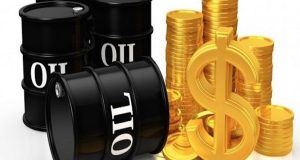 The global oil benchmark, Brent crude, extended its gains on Monday, rising to its highest level in more than two years.
The global oil benchmark, Brent crude, extended its gains on Monday, rising to its highest level in more than two years.
The sharp increase came on the back of fast-growing demand and Turkey’s threat to Iraqi Kurdistan’s crude exports as the autonomous region holds a referendum on independence.
Brent, against which half of the world’s oil is priced, rose by $1.96 to $58.82 per barrel as of 7.10pm Nigerian time, the highest level since July 2015.
It has gained more than 30 per cent since June as global stockpiles have tightened, with demand in industrialised countries expanding alongside emerging markets for the first time in almost a decade.
West Texas Intermediate, the US benchmark, was increased by two per cent to $51.79 per barrel barrel, its highest level since May.
The Financial Times reported that prices received a further injection of momentum after Turkish President, Recep Erdogan, warned Iraqi Kurdistan that he opposed its independence referendum as its residents voted on Monday, saying Ankara could shut off its main export pipeline and economic lifeline.
“We have the tap. The moment we close the tap, then it’s done,” Erdogan said, though he stopped short of saying he would go ahead and block the roughly 550,000 barrels per day of landlocked Kurdish oil that flows to his country’s Mediterranean port of Ceyhan.
Kurdish oil exports have soared since 2014, allowing the Kurdistan Regional Government to plan for an eventual push for independence from Iraq, despite opposition from the US, Turkey and Iran, who fear more instability in the region.
The oil market has so far, however, been relatively sanguine about the threat to Kurdish exports, which have been helped by international trading houses Vitol, Trafigura, Petraco and Glencore, as well as Russia’s state-backed oil company, Rosneft.
Supporting crude’s recent gains have been strong imports from China as the country builds its strategic petroleum reserve, which Beijing is growing to cushion the world’s second-biggest economy from future energy shocks.

